There is an increasing awareness of and appreciation for the inherent link between faith and reason, and between religion and science. One way in which this is manifesting itself is in the thriving life sciences departments at many Catholic colleges and universities.
Ave Maria University established its permanent campus near Naples, Florida, in 2007. A proudly devout Catholic community, Ave Maria strives to integrate the faith into every aspect of university life, including all academic disciplines. The university offers 34 majors to approximately 1,100 students from 45 states and 20 countries.
The university’s stated mission is that it is a Catholic liberal arts institution of higher learning devoted to the Mother of God, inspired by Pope St. John Paul II and St. Teresa of Calcutta, “and dedicated to the formation of joyful, intentional followers of Jesus Christ through Word and Sacrament, scholarship and service.”
Love of nature
One discipline in which the university lives its Catholic identity is marine biology, which until recently was only offered as a minor but is now a major. The biology department is integrated into the fuller academic curriculum.
“All of our students are required to take philosophy and theology, and if they, especially our biology majors, integrate the knowledge they receive well, then they are able to consider biological matters in different ways and ask deeper questions,” said Nicholas E. Curtis, associate professor and chair of the department of biology at Ave Maria. “Our goal is to nullify the false opposition between faith and science; we want them to see the harmony of faith and reason and understand the proper role that science serves in the fullness of seeking truth, integrate it and then use it to serve the common good.”
The writings of St. John Paul II, Pope Benedict XVI and particularly Pope Francis’ encyclical Laudato Si’ (“Praise Be to You”) play a significant role in the approach to biology at Ave Maria. There is also something called “Green Thomism,” which is stewardship of creation based on the teachings of St. Thomas Aquinas. “At AMU, we are dedicated to fostering a biology department that educates students to think in and with the Church,” said Curtis.
Studying biology, according to Curtis, produces a deep appreciation for, and understanding of, life’s ordered processes “inherent to the harmony, beauty, and intelligibility of the created order.” “A biologist must understand and ‘respect the laws of nature and the delicate equilibria existing between the creatures of this world,'” he said, quoting paragraph 68 of Laudato Si‘.
“Everything in the created order has a purpose and is given existence and held in existence by God,” he said; “It is also a gift from God just as it was to Adam and Eve. With that said, a life working in the field of biology, whether at a lab bench or in the field studying fish or mammals, should perpetuate a greater appreciation for God’s creation.”
A biologist should have a great love for creation because they know it so well, said Curtis. “They understand how to properly cultivate, protect and preserve creation and should desire to carry out this call to stewardship that was originally given to Adam and Eve.”
Sustainability
Ave Maria is not the only university that is putting into practice the Church’s teaching on the care and stewardship of creation. At the University of St. Thomas in St. Paul, Minnesota, the biology department is engaged in several initiatives that help the university foster and live that stewardship.
One of these initiatives is sustainability. Sustainability has been a central goal of the university since Father Dennis Dease, a former president of the university, committed to move the university toward carbon neutrality. Sustainability is an important mission, especially at a Catholic university,
“Part of our mission involves training students to become ‘morally responsible leaders who think critically, act wisely, and work skillfully to advance the common good,'” said Gaston Small, associate professor of biology at the University of St. Thomas. “Engaging students in sustainability research is an excellent way to accomplish this objective.”
“We only have one habitable planet and it is our collective responsibility to take care of it for ourselves and coming generations,” said Kevin Theissen, professor of geology. “Catholic teaching highlights the importance of stewardship of the environment and care for all of creation. Pope Francis has written about the moral imperative to address the problem of human impacts on climate and the environment. The strong and growing emphasis on sustainability at UST is aligned with this.”
Caring for creation
On the University of St. Thomas campus in St. Paul, there are two large greenhouses and other gardens, operated by the biology department. These greenhouses are used for research purposes, featuring a wide variety of plants in a wide variety of environmental settings; there is also a medicinal garden, which, according to the university’s website, is reminiscent of monastery gardens from the Middle Ages. “It was designed to be both a source of plants for laboratory teaching and research, and a spot for quiet and solitude.”
In this garden grow Native American medicinal plants (like tobacco and boneset), modern pharmaceuticals (like opium poppies and foxglove), traditional herbal medicines (like comfrey and valerian root), and modern herbal supplements (like St. John’s wort and garlic).
Small is particularly suited to the sustainability efforts at the University of St. Thomas. His teaching and research is directly related to sustainability, including teaching courses such as biology of sustainability, environmental problem solving, aquatic ecology and urban ecosystem ecology. He incorporates a service element into these courses, in which the students use their exceptional talents to assist the community.
“Through these courses I engage my students in real-world projects with community partners through our Sustainable Communities Partnership program,” he said. One example of such a collaboration was working with the City of Elk River to develop an early warning model for bacterial contamination in Lake Orono; in another case, they worked with the Mississippi Water Management Organization to assess whether urban agriculture can be used to treat polluted stormwater.
Small emphasizes to his students that, through partnerships like these, sustainability and stewardship for creation are more than intellectual concepts. We live in a real world, and real steps must be taken to ensure that God’s creation is appropriately taken care of.







